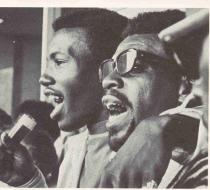North Hall Takeover at UCSB Favorite
For some, October 14, 1968, was a clarion call to the future.
On that day, a group of 12 black students at UC Santa Barbara, tired of the unequal treatment and passive-aggressive racism they received as Black athletes — and as members of the campus community at large — barricaded themselves in the university’s North Hall.
Through their act of civil disobedience, the students brought attention not only to their own circumstances, but also to those of their fellow classmates who did not see themselves reflected in academia.
“Something Drastic”
“Everyone agreed we needed to do something drastic,” recalled James Johnson, a UC Santa Barbara alumnus and a North Hall activist. Johnson, who had transferred to UC Santa Barbara from Los Angeles Community College, had a history of activism and the group solicited his advice.
“I was the one who’d been an activist,” Johnson said. “But the rest of my colleagues weren’t. They were students faced with a situation. Someone came up with the computer center because it was a vital part of the university. They couldn’t run the campus without it.”
That someone was Murad Rahman (Maurice Rainey at the time), a graduate student in sociology and chair of the campus’s Black Student Union (BSU). Although some suggested seizing the chancellor’s office, Rahman believed that occupying the computer center would provide a strategic advantage because the university would not want it damaged or destroyed.
So they made a decision. “We planned it, and the next morning we did it,” Johnson went on. “We could capitulate or we could stand up for ourselves.” For 12 hours the next day, they occupied the building — temporarily renaming it Malcolm X Hall.
UC Santa Barbara undergraduate Booker Banks played a key role in the occupation, using a microphone to mesmerize, inform and entertain the large number of white students who surrounded the building. Banks was able to articulate the Black students’ message and why the takeover was occurring. Rahman noted that that if law enforcement had wanted to rush the building, they’d have had to overwhelm student sympathizers outside.
In Search of Relevant Knowledge
The Black students’ action worked. As a result of the North Hall Takeover and the students’ demands for more relevant curriculum and a more comfortable climate on campus for Black students, a process of institutional change began that resulted a year later in the founding of the Department of Black Studies and the Center for Black Studies Research — one of their core demands.
“What we wanted was knowledge taught at UC Santa Barbara that was relevant to our experience in America,” said Dalton Nezey, an undergraduate alumnus, football player and North Hall activist. “And we believed that was knowledge every student at UCSB needed to learn to be an aware citizen.”
The takeover impacted other areas of ethnic and gender studies as well. It contributed to the establishment of the Chicano and Chicana studies department in 1969, and opened the door to the creation of the Asian American studies department, the women’s studies department, which would become the Department of Feminist Studies, and other research areas that currently examine inequality and a multicultural world.








